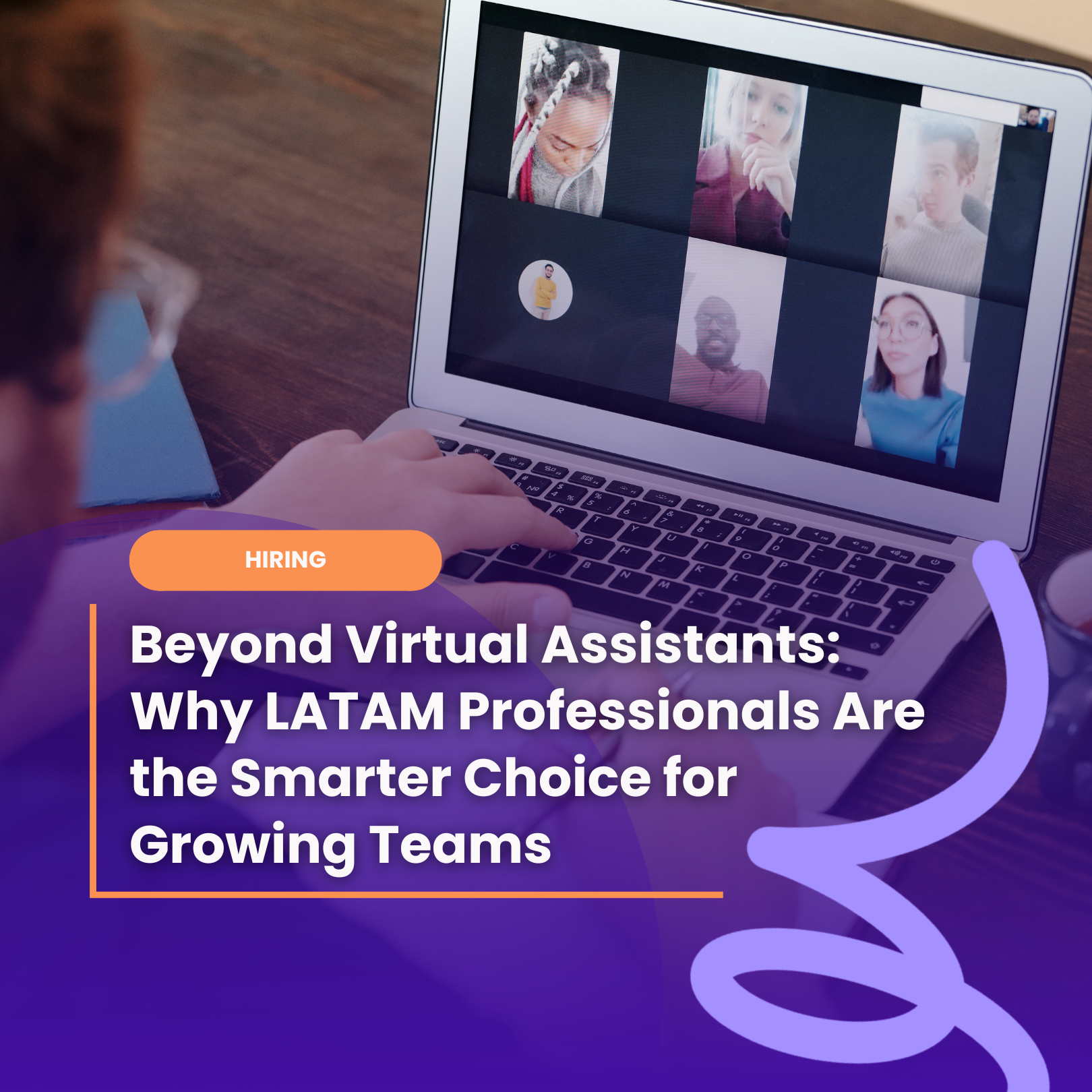Beyond Virtual Assistants: Why LATAM Professionals Are the Smarter Choice for Growing Teams

Is your business growing beyond the needs of a virtual assistant? Learn when it's time to move from task support to strategic team members with LATAM professionals who bring real expertise, real-time collaboration, and real results.
For years, virtual assistants (VAs) have helped business owners regain time and stay on top of day-to-day tasks. They’ve become a go-to solution for solopreneurs, startups, and growing businesses needing administrative support at a low cost—and for good reason.
But as your business grows, so do your needs.
If you’ve found yourself asking more of your VA than they’re equipped to deliver—or if you’re starting to look for team members who bring strategy, autonomy, and professional expertise to the table—it might be time to think beyond the VA model.
That’s where remote professionals from Latin America (LATAM) come in.
This blog isn’t about choosing one “better” than the other. It’s about knowing when each option fits—and understanding how LATAM professionals can help mid-sized teams scale smarter, faster, and with more confidence.
What Is a Virtual Assistant—and Why Are They So Popular?
A virtual assistant (VA) is typically a remote worker who helps with routine administrative tasks—things like managing calendars, replying to emails, organizing files, data entry, basic research, or customer support. Most virtual assistants are hired on a part-time or hourly basis, often through global freelance platforms or VA agencies.
Their popularity exploded for a reason:
- They're affordable
- They're often available on flexible schedules
- They help solo entrepreneurs and small teams stay on top of repetitive work
For many early-stage businesses, VAs are a smart first step to get out of the day-to-day weeds and delegate time-consuming tasks.
But while they’re valuable for tactical support, most VAs aren’t hired to manage complex projects, collaborate in real time, or operate as strategic contributors. That’s not their role—and for companies starting to scale, it’s often no longer enough.
What Traditional VAs Do Well (and When They’re a Great Fit)
Let’s be clear: Virtual assistants provide valuable support when used in the right context. Many VAs are highly reliable, organized, and efficient with administrative tasks like:
- Managing email and calendars
- Scheduling appointments
- Basic customer support
- Data entry or research
- Document formatting and file organization
If you’re a founder juggling a little bit of everything, VAs can be a powerful stopgap to help keep the ship running while you focus on growth.
But here’s where the distinction begins: most virtual assistants are trained for task execution, not for owning outcomes, driving strategy, or operating within complex systems.
And that’s totally okay—if what you need is task support.
What Growing Teams Really Need: More Than a Task-Taker
As your company matures, the gaps become clearer:
- You need someone who can manage clients or systems, not just take notes.
- You need people who understand how your business runs—and make it better.
- You want support that integrates with your team, not floats on the edge of it.
This is the moment many companies realize they don’t need another pair of hands—
they need a reliable, high-performing remote team member who brings skill, autonomy, and accountability.
That’s when LATAM professionals become the smarter, more strategic choice.
The LATAM Professional Advantage
Professionals from Latin America aren’t “super VAs”—they’re remote employees with career expertise in fields like:
- Project management
- Marketing operations
- Development and QA
- Customer experience
- Executive-level support
- Finance, HR, and more
They’re hired not just to support the business—but to move it forward.
Here’s what sets them apart:
Same Time Zones = Real-Time Collaboration
LATAM professionals operate in EST, CST, and PST time zones. That means you’re not waiting 12 hours for responses or sending instructions overnight. Instead, you get:
- Real-time check-ins
- Instant collaboration
- Seamless integration with U.S. team workflows
For businesses where timing matters (client meetings, agile development, fast campaigns), this alignment changes everything.
Higher Education and Domain Experience
Many LATAM professionals hold undergraduate or advanced degrees in business, engineering, marketing, or finance. They often come from global companies or agencies and are familiar with U.S. tools, KPIs, and performance expectations.
You’re not hiring someone to follow steps—you’re hiring someone who understands the bigger picture.
Fluent English and Strong Communication
Clear communication is the cornerstone of remote work. LATAM professionals bring strong English proficiency and business communication skills, often tailored to U.S. clients and teams.
They know how to navigate tools like Slack, Zoom, Asana, HubSpot, and GSuite—and they do it with confidence.
Cultural Compatibility and Ownership Mindset
This isn’t just about language—it’s about collaboration style. LATAM professionals tend to align closely with U.S. workplace culture: they’re proactive, resourceful, and solution-oriented.
They don’t wait to be told what to do—they take initiative, raise red flags early, and contribute ideas.
So When Should You Choose a VA—And When Should You Upgrade to a LATAM Professional?
The difference isn’t about geography—it’s about role complexity and business stage.

If your needs are still tactical and transactional, a VA might be a great first step.
But if you're scaling operations, leading more complex projects, or need talent you can rely on long-term—it's time to hire someone who acts like a team member, not a contractor.
Why Romy Specializes in LATAM Talent
At Romy Consulting, we help mid-sized U.S. companies build remote teams that actually scale with the business. We specialize in sourcing elite LATAM professionals who bring:
- Professional experience
- Cultural alignment
- Real-time availability
- Strong communication
- Ownership mentality
We don't just find talent—we find the right fit. Then we handle vetting, onboarding, compliance, payroll, and long-term support.
So you can stop worrying about who’s handling what—and start getting more done with people you trust.
Conclusion: Your Remote Team Should Feel Like Your Team
Hiring support shouldn’t feel like a gamble. Whether you’re outsourcing for the first time or upgrading your current structure, the goal is the same: to build a team that helps your business thrive.
Both virtual assistants and remote professionals have a place in that journey.
But if you’re at the point where your business needs strategic execution, not just admin support, it’s time to look beyond the VA model.
Let’s Find the Right Professional for Your Team
Book your free Talent Insight Call today
We’ll show you how LATAM professionals can help you reduce your workload, scale faster, and build a remote team that feels fully part of your company.
Take the First Step Toward Growth.
High-quality talent, hassle-free hiring, and full support from start to finish. Let’s build your dream team that helps your business thrive.



